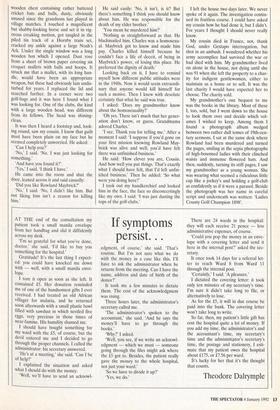If symptoms
persist.. .
AT THE end of the consultation my patient took a small manila envelope from her handbag and slid it diffidently across my desk.
`I'm so grateful for what you've done, doctor,' she said, 'I'd like to buy you something for the hospital.'
Gratitude! It's the last thing I expect- ed: you could have knocked me down with — well, with a small manila enve- lope.
I tore it open as soon as she left. It contained £5. Her donation reminded me of one of the handsomest gifts I ever received. I had treated an old African villager for malaria, and he returned soon afterwards with a small plastic bowl filled with sawdust in which nestled five eggs, very precious in those times of near-famine. His humility shamed me.
I should have bought something for my ward with the £5, of course, but the devil entered me and I decided to go through the proper channels. I called the administrator: his secretary answered. `He's at a meeting,' she said. 'Can I be of help?'
I explained the situation and asked what I should do with the money.
`Well, we'll have to send an acknowl- edgment, of course,' she said. 'That's routine. But I'm not sure what we do with the money in a case like this. I'll have to ask the administrator when he returns from the meeting. Can I have the name, address and date of birth of the donor?'
It took me a few minutes to dictate them. The cost of the acknowledgment was rising.
Three hours later, the administrator's secretary called me.
`The administrator's spoken to the accountant,' she said. 'And he says the money'll have to go through the books.'
`Why?' I asked.
`Well, you see, if we write an acknowl- edgment — which we must — someone going through the files might ask where the £5 got to. Besides, the patient really gave the money to the whole hospital, not just your ward.'
`So we have to divide it up?'
`Yes, we do.' There are 24 wards in the hospital: they will each receive 21 pence — less administrative expenses, of course.
`Could you pop the money in an enve- lope with a covering letter and send it here in the internal post?' asked the sec- retary.
It once took 14 days for a referral let- ter to reach Ward 8 from Ward 11 through the internal post.
`Certainly,' I said. 'A pleasure.'
I dictated the covering letter: it took only ten minutes of my secretary's time. I'm sure it didn't take long to file, or alternatively to lose.
As for the £5, it will in due course be paid into the bank. The covering letter won't take long to write.
So far, then, my patient's little gift has cost the hospital quite a lot of money. If you add my time, the administrator's and the accountant's time, my secretary's time and the administrator's secretary's time, the postage and stationery, I esti- mate that my patient owes the hospital about £175, or £7.56 per ward.
ft's lucky for her that it's the thought that counts.
Theodore Dalrymple










































 Previous page
Previous page